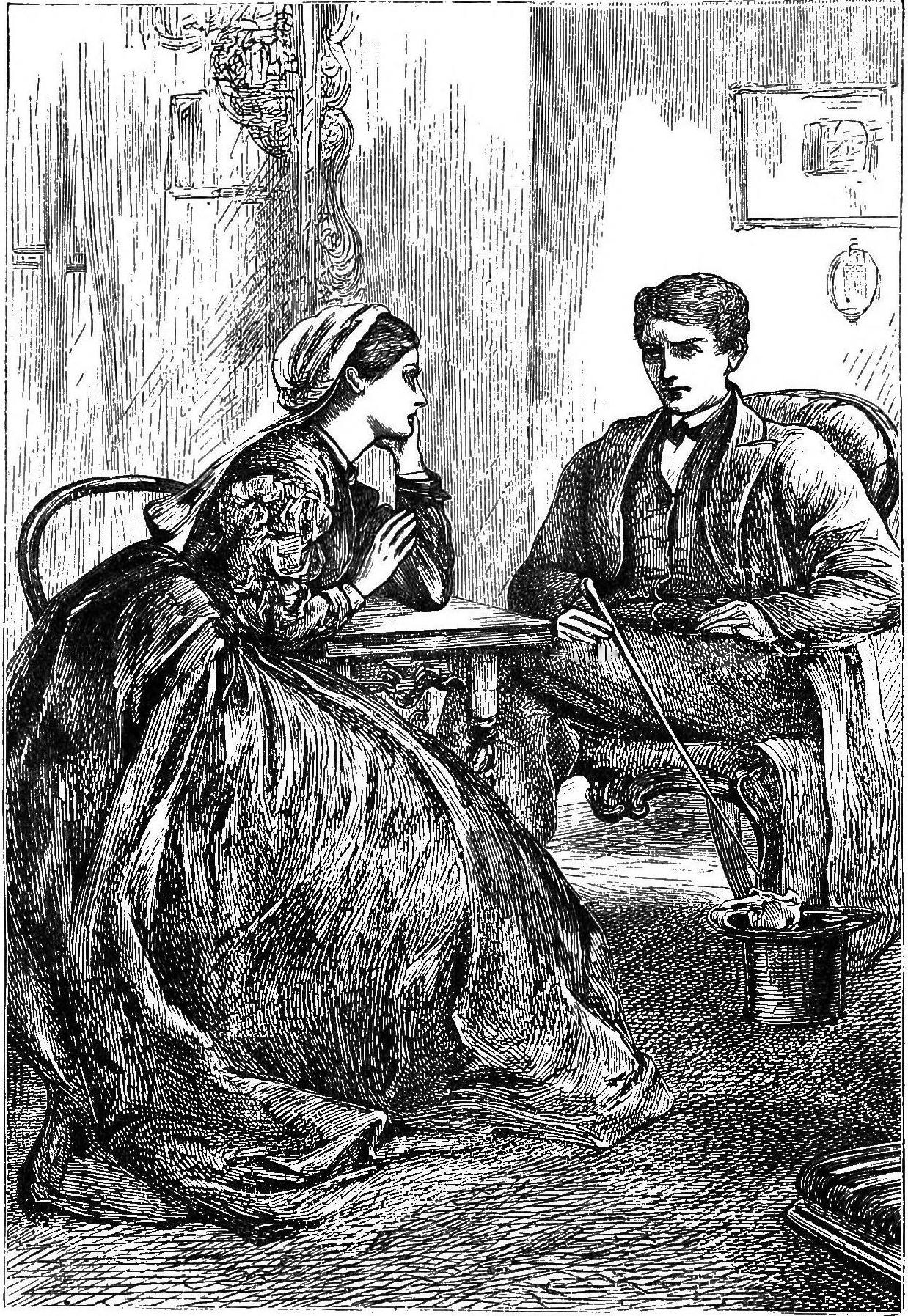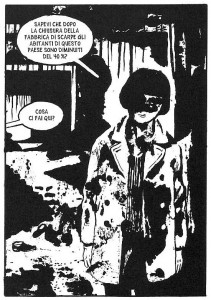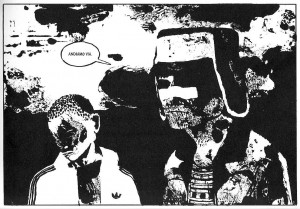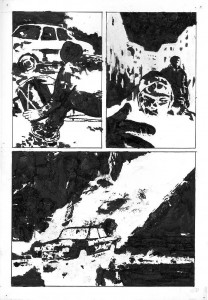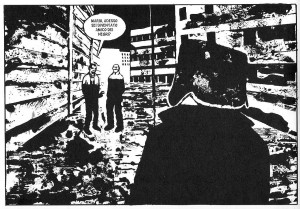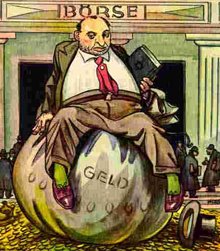Eli Roth’s Hostel movies are notoriously violent and gory. They’re supposed to have inaugurated a new, updated version of horror cinema — torture porn, which is supposedly more explicit, more stomach-churning, and more sadistic than anything that came before.
So I was…not exactly startled, but maybe mildly disappointed/pleased to discover that the new boss is the same as the old boss. The Hostel films aren’t exponentially worse than any other horror film I’ve seen. They’re just basic slashers, with medieval torture devices as killing gimmicks. Effectively graphic, sure, but not moreso than Freddy’s macabre dreamscape liquefying, or even really than Jason’s trusty weapons, blunt or edged.
That’s not to say that Hostel has no new tricks up its bloody apron. On the contrary. Slashers are generally built around an axis of violence/revenge. You have some horrible all-powerful Thing, which systematically tortures and murders in an apotheosis of satisfying sadism. And then, in the second half, the poles are switched, hunter becomes hunted, and that big bad Thing is remorselessly brutalized. That’s why it makes sense to think of rape/revenge films as slashers; it’s the same basic dynamic, just with rape instead of murder (and/or, alternately, slashers can be seen as rape/revenge films with the murder substituting — often not especially subtly — for rape.)
As the rape/revenge comparison makes clear, slashers often get their energy from gender animosity. Everybody in slashers is being punished for something, but one of the most common acts which elicits punishment is sexual activity. This goes for guys too, but, of course, the audience and the male gaze being what they are, there’s generally a lot more interest in seeing the girl’s bare all…and then to have them punished either hypocritically for provoking desire, or more straightforwardly for not satisfying it. And after the punishing, you switch in the final half and identify with the female/victimized punished, who now gets to dismember the killer/rapist, so the audience can both revel in her sadistic accomplishment and enjoy the masochistic thrill of castration.
Gender isn’t the only lever that works here; slashers often instead (or also) use class animosity to power their fantasies of alternating sadism/masochism. So in The Hills Have Eyes, we watch the deformed feral reprobates battle the city folk. And, of course, the city folk get punished for being city folk, and the reprobates get punished for being reprobates, and the studio audience gets to hate/love both and revel in their pain/brutality.
Eli Roth is I’m sure perfectly aware of all these dynamics (I’d bet he’s read Carol Clover Men, Women, and Chainsaw just like I have.) And in Hostel, he very cleverly tweaks them. Rather than fitting the murder/revenge onto the primary binary man/woman, or rich/poor, he changes it up,and fits it onto the division American/foreigner — or perhaps more accurately, Westerner/Easterner. The movie insightfully realizes that the most loathsome, vile, and worthless people on the planet are American frat boys on tour…and it gleefully sets out to torture them to death. But it also and simultaneously taps into the all-American nightmare of the decadent Europe/East with its forbidden pleasures and unspeakable corruption. In short, Hostel is like a Henry James novel with severed fingers, screaming, and nudity.
The nudity and the sex is quite important, not just for its prurient value, but thematically. As I said, slashers usually revel in the animosities of gender…but they usually do it by making the women the victims (first…and then later the victimizer.) Roth, though, shuffles the roles. It’s the American backpackers (and their Scandinavian friend) who are presented first as sexual aggressors. For them, Europe — and especially that Hostel in Slovakia — is a pornutopia — a place to pull out their money and their balls and go to town (or, alternately, in the case of sensitive guy Josh, a place to whine on a shoulder about his lost love, and then pull out money, balls, etc.) The Westerners’ casual sense of entitlement — their belief that, yeah, Europe is basically a hole to stick their bits in — is both their downfall and what makes them deserve their downfall. Probably the best scene in the film is when backpacker Paxton (Jay Hernandez) staggers away from the eviscerated Josh to confront Natalya (Barbara Nedeljakova), one of those available girls, who, he now realizes, had set them up to begin with. “You bitch!” he screams at her, to which she responds, with great gusto, “I get a lot of money for you, and that makes you MY bitch.”
That’s the slasher in a nutshell; I’m your bitch, then you’re mine. The Americans rule the world and use their money to turn everyone into meat in their entertainment abattoir — but that makes them basically as dumb as their stupid trimmed foreskins, and this one woman, at least, has reversed both the entertainment and the abattoir on behalf of the whole damn world. Now, at last, for exorbitant prices, the shady middlemen will arrange for you to fuck those Americans up, down, and sideways, just as they’ve always, through those middlemen, done to you.
But inevitably those corrupt Europeans can’t get let off that easy. Paxton manages to escape, aided (more symbolically than diegetically) by the cross-cultural juju imparted by his knowledge of German. And it’s there, unfortunately, that the movie starts to be too clever for its own good — or maybe Roth’s cleverness just failed him. Either way, Roth’s set-up is so elaborate — what with the entire village involved in the conspiracy and wealthy out-of-towners coming in from all over Europe to get a literal piece of the other — that by the time we get to the end of the thing, it’s hard to figure out where the revenge fits in. Thus the director has to put his hand, and then a couple of feet on the scales of justice to make everything work out. And so, while fleeing, Paxton just so happens to see Natasha and her deceitful friend wander out in front of his car so he can run them over. Then, a little later, he coincidentally ends up in the same train as the creepy Dutch businessman who murdered his friend.
In a really satisfying (or bleak, same difference) revenge narrative, like “I Spit on My Graves” or “Straw Dogs,” or “Death Proof”, or even “Friday the 13th IV”, the violence/reverse violence is remorseless pendulum; the axe goes forward, the axe goes back, as sure as the world turning round its bloody sun. With Hostel, though, you can see the implement of destruction fall to the wayside, so that the director has to go pick it up, paint some gore on there, and hand it back to the befuddled protagonist. You never really believe that Paxton is a cold killer; he hasn’t found his inner resources, and/or lost his soul. He just happened to be the guy picked to be standing at the end, and the guy standing at the end has to take revenge. The plot and the genre conventions just never quite manage to reconcile themselves to each other.
Part of the problem, perhaps, is that the dynamics of globalization can be fit only uncomfortably on the slasher binaries. Men/women, upper class/lower class — those are old, old hatreds, graceful in their cthonic simplicity. Capitalism, though, is multipolar and diffuse. It isn’t here or there, but everywhere; there is no one bad guy, like Jason or Freddy, but a technology of pleasure which distributes sadism and desire to everyone and no one. Roth takes great pains to allow Paxton to kill the individuals who tormented him and his friends, but the supposed catharsis dissipates into clumsy anti-climax. The sexy girls may have suckered Paxton; the Dutch businessman may have murdered his friend, but the real enemy isn’t either sexy girls or businessman. The real enemy is the system that uses money to transform people into things — a system of such overwhelming power, with its tendrils in so many aspects of society (the hostel, the village, the police…the world?) that there’s never even a question of confronting it. The capitalism in Hostel corrodes it’s belief in its own rape/revenge empowerment fantasy — and without that faith in its genre, the end of the film comes across more adrift than driven.
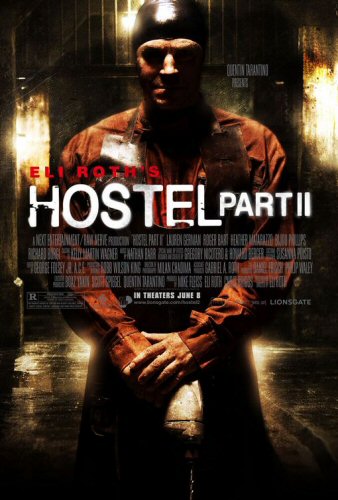
Which is, perhaps, why Roth made an almost unheard of choice for an exploitation sequel, and substantially changed his formula. Oh, sure, the Hostel is still there, and the basic set up — the Slovakia setting, the torture, etc. etc., is all in place, and the victims are still three backpackers. In this case, though, the backpackers are women — which instantly rearranges many of the tensions of the last film. The three protagonists here are going to enjoy a spa, not to screw native girls. From an early scene where they’re menaced by creepy assholes on the way to Slovakia, they’re always presented as vulnerable and endangered, not as exploiters.
Moreover, Hostel II is at least as interested in the logistics of its torture auction, and in the torture-purchasers, as it is in the victims. Stuart and Todd, who buy the chance to torture our heroines, are a lot like the vacuous American fratboys in the first film — only these guys are far enough along in their careers that they can purchase more expensive meat.
By spending so much time showing us the mechanics of doom, Hostel II cheerfully chucks most of its suspense; we know what’s going to happen already, after all. The first film began as a callow road comedy and slid slowly towards horror; the second, though, teeters on farce from beginning to end. If the emblematic moment in the first movie is the scene where Natasha reveals to Paxton whose bitch is whose, the quintessential scene in the second film probably occurs when poor awkward Lorna (Heather Matarazzo) is strung up naked in the air over a bath ringed with candles. The hulking Eastern European guards go about with a bored efficiency positioning Lorna just right, lighting all those wicks, and then, with businesslike nonchalance, exiting stage right. Shortly thereafter, a woman comes in, strips naked, lies in the bath, and begins chopping at Lorna with a scythe so that she can bathe in her blood. The combination of banality and hyperbolic decadence isn’t even especially suspenseful; instead, it comes across more as a knowing, gleeful snicker. You want tits and torture brought directly to the comfort of your boring home? No problem; just wait a second while we hit the lights, put everything in place, and then saunter off camera….
Most of the torture scenes are like that; more Three Stooges than Hannibal Lecter. While menacing his victim, Todd accidentally unplugs his chain saw…then on a second try slips and accidentally cuts her face in half before he meant to, leading him to give up on the project altogether (since he refuses to finish the kill, violating his contract, the guards shrug and turn the dogs on him.)
Even the climactic Final Girl escape is a deliberate anti-climax. She triumphs not through smarts or strength (though she does exhibit both of those) but rather through sheer force of capital. Beth (Lauren German) is, as it turns out, really, really rich, and she simply extricates herself by dumping a ton of money in the lap of Sasha (Milan Kažko), the businessman in charge. In this case, the phallus of potency and power isn’t a gun or a knife; it’s cash, as Beth demonstrates decisively when, just before striding out of her cell, she snips off her tormenters balls — prompting all the scruffy guards to flinch as one.
That’s a pretty entertaining finish, and perhaps the film should have just ended there. Once again, though, Roth has to choose between being true to his capitalist vision and fulfilling his slasher tropes…and he chooses the second. Beth gets inducted into the evil fellowship of lucre, up to and including having to get the secret sign of the bloodhound tattooed on her butt. She’s an initate…and the first thing she does with her newfound status is to go out into the town and kills with her own hands willowy two-faced Axelle (Vera Jordanova) — the frenemy who tricked her into coming to the hostel in the first place.
That’s how slashers are supposed to resolve — with an eye for an eye. But in this context it just seems kind of dumb. I mean, why bother? Beth doesn’t become powerful by killing Axelle; she’s already — and even from the beginning — more powerful than anyone in the film. She can, as one of her friends says, buy the entire town, hostel and all. It wasn’t that, like most Final Girls, she was first weak and then found something within her that could be strong. On the contrary, though we didn’t know it, she always was the biggest one in the room tougher than Jason, more all-powerful than Freddy.
This isn’t, then, about Beth learning to be strong. Nor is it about Beth fighting off her killer and thereby becoming a killer herself. On the contrary, the issue is not her soul but her bank account. Personal, individual revenge in this context seems quaint. After all, if she wanted to, Beth could have just paid Sasha to take Axelle into the dungeon, and watched as some random penny-ante punter cut her to pieces. Hell, she could have paid the guards to do the same to Sasha; why not? She’s got the money.
Roth seems determined to ignore this insight. Like that weird Dutch businessman in the first film who eats salad with his trembling hands because he wants to feel “that connection with something that died for you,” Roth is wedded to that old-fashioned Old Testament slasher morality, where you take a life for a life, person to person. But sympathetic as he is to genre tradition, Roth’s films end up being about newer gods — gods that are only more fearsome because they never get their hands dirty.
